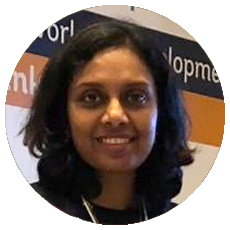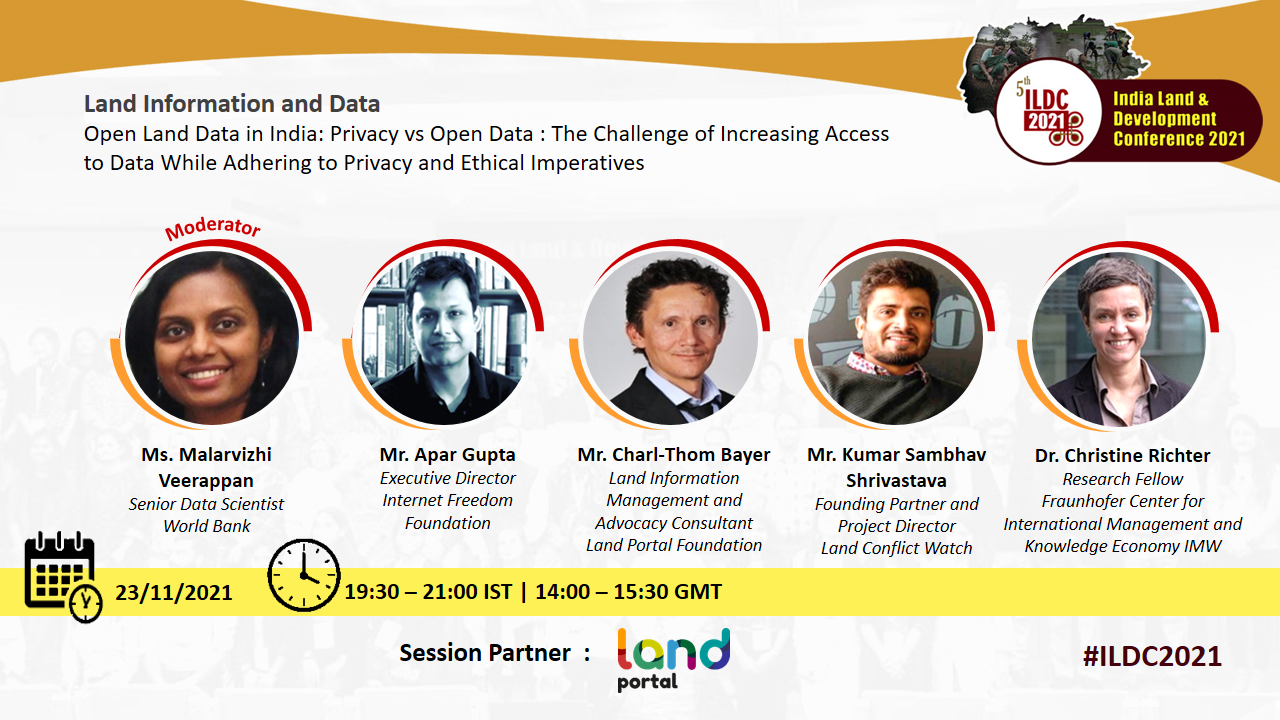REGISTER HERE:
https://landtenurehub.org/registrationildc2021/
November 23, 2021
3:00 - 4:30 PM Central European Time / 7:30 PM - 9:00 PM India Standard Time
Moderator

Malarvizhi Veerappan
Panelists

Christine
Richter

Apar
Gupta

Kumar
Sambhav

Charl-Thom
Bayer
Moderator:
Malarvizhi Veerappan, World Bank
Panelists:
Dr. Christine Richter, Innovation Acceptance group, Fraunhofer IMW
Apar Gupta, Internet Freedom Foundation
Kumar Sambhav, Land Conflict Watch
Dr. Char-Thom Bayer, Land Portal Foundation
This session will examine the conflict between the need for open data and the right to privacy.
The amount of data and information that is publicly available is unprecedented in history, and this is only going to increase. This level of access to information has often resulted in more transparency and accountability in many countries while driving digital innovations and services. Access to information, especially spatial information also forces us to confront, sometimes uncomfortable, compromises between the right to privacy and the ethical deployment of open data. Increasingly data has come to be seen as a public good and a necessary public infrastructure, much as one considers the energy infrastructure as a public good. Not only does geospatial data enable the tracking of locations, geospatially referenced imagery allows for near real time identification of individuals. However geo-spatial data and georeferenced imagery form part of the core land related datasets required for improved land and environmental management and land rights protections, especially for women, the youth and the most vulnerable. This is also the data about which governments tend to be more guarded. In addition, advocates of open data must also contend with copyright legislation, which, (while the fundamental principles remain valid), often has been argued as being outdated, inappropriate, inequitable or downright harmful and not supportive of innovation.
The question therefore that open data advocates must contend with, is on the one hand, how to manage the public goods aspect of open land data systems that promote innovations in digital services, but is also a key factor in the resilience of land governance systems, especially as we navigate the impacts of climate change induced global disasters such flooding as well as the COVID-19 pandemic? On the other hand, what assurances must open data systems provide, to reassure the and maintain public confidence that privacy considerations are protected and that data will be used ethically and in support of inclusive economic development as well as support for social and economic protections for the most vulnerable?
India promulgated the Right to Information Act, No. 22 of 2005 and the Open Data Policy (NDSAP) in 2012 set the stage for the “the right to information for citizens to secure access to information under control of public authorities” and provides a comprehensive framework and standards for data sharing by government agencies. Critics have argued that digital innovation and economic development have been stifled due to the inability to access spatial data, despite the efforts of a multitude of volunteer mapping and data organizations taking up the challenge of providing open data.
This session will interrogate the seemingly contrasting desire for more open data systems and increasing concerns regarding ethics and privacy. This discussion will examine the two propositions through the lens of the Open Data developments in India and will deliberate on the ethics and privacy concerns of the Open Up Guide as a tool for promoting ethical and equitable open land data systems.

